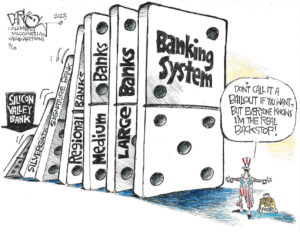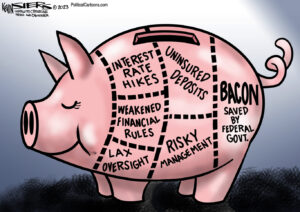Big Banks Are Victims of Their Own Success
Now that Wall Street has managed to neuter and delay the modest reforms passed by Congress, there is more political momentum to pass stricter financial regulations.
Now that Wall Street has managed to neuter and delay the modest reforms passed by Congress, there is more political momentum to pass stricter financial regulations.
Sens. Sherrod Brown, D-Ohio, and David Vitter, R-La., have introduced a bill that has the biggest banks screaming. Among other things, it would impose stiff capital requirements (forcing the banks to protect themselves against losses) and it would try to prevent the sort of bailouts that have been so universally despised by the public (it’s the only subject tea partyers and progressives can safely broach at Thanksgiving).
“It probably won’t get passed,” writes Jesse Eisinger over at ProPublica. However, “If the bankers who blew up the financial world had been held accountable, the popular fury that fuels this bill would have dissipated by now.” The legislation is not without its faults, in Eisinger’s estimation, but it is a bold step in the right direction.
Jesse Eisinger for ProPublica:
So, it is better to have higher equity capital. But Brown-Vitter doesn’t go far enough. The bill’s definition of equity could be tighter. It still contains bookkeeping entries called intangible assets and deferred tax assets, which don’t absorb losses.
But, gratifyingly, Brown-Vitter does tighten up the definition of assets. Capital is the numerator and assets are the denominator. Both need to be made as solid and trustworthy — and resistant to manipulation by banks or regulatory capture — as they can be. When calculating assets, Brown-Vitter tightens up rules on things like how the banks measure their exposure to derivatives.
Oh, the critics shout, this is just a backdoor way of making banks smaller. The bill’s authors fail to understand that diversity of exposure saves gargantuan banks, they say. This requires a slap to the side of the head and a one-word rebuttal: Citigroup. Citi blew up because of its exposure to collateralized debt obligations. That exposure was dismissed and misunderstood by the top ranks because it was seemingly small as a portion of the bank’s balance sheet. It was wonderfully diversified into all kinds of investments, which didn’t help at all. Sure, small banks are less diverse. But when they collapse, the problem is more manageable.
— Posted by Peter Z. Scheer.
Your support matters…Independent journalism is under threat and overshadowed by heavily funded mainstream media.
You can help level the playing field. Become a member.
Your tax-deductible contribution keeps us digging beneath the headlines to give you thought-provoking, investigative reporting and analysis that unearths what's really happening- without compromise.
Give today to support our courageous, independent journalists.




You need to be a supporter to comment.
There are currently no responses to this article.
Be the first to respond.